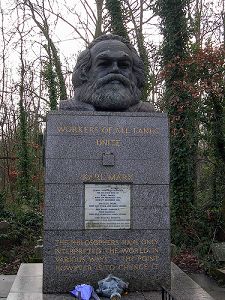130 years since Karl Marx's death
- By Heiko Khoo
 0 Comment(s)
0 Comment(s) Print
Print E-mail China.org.cn, March 14, 2013
E-mail China.org.cn, March 14, 2013
 |
|
Tomb of Karl Marx in Highgate cemetery, London. |
On March 14, 1883, Karl Marx died at 41 Maitland Park Rd in Chalk Farm, London. Three days later only 12 people attended his funeral in Highgate Cemetery where Friedrich Engels ended his oration with the words:
"His name will endure through the ages, and so also will his work!"
Karl Marx was born in Trier, Prussia on May 5, 1818. His family were German Jews who adopted Lutherianism for pragmatic reasons. Marx studied philosophy, law and history in Berlin, joining the intellectual conflict surrounding the legacy of the philosopher Georg W.F. Hegel. Hegel studied change and progress by revitalizing the ancient Greek idea of dialectics. Dialectics studies the way in which contradictory forces underlie appearances, and eternal fluid motion replaces static definitions. Conservative Hegelians claimed that the Prussian state incarnated historical progress; radical Hegelians believed that existing power and authority, including that of the Emperor, bureaucracy, army and religion, were transient forms riven with contradictions and certain to pass away.
Marx also adopted the materialist philosophy of Ludwig Feuerbach who presented the Christian god as a man-made creation and an expression of humanity. Marx forged a new and unique revolutionary doctrine by combining dialectics with materialism.
After university Marx entered the political arena as a journalist for the Rheinischer Zeitung, a radical bourgeois newspaper. He soon became its editor but the Prussian authorities forced the paper to close down. Marx married his childhood sweetheart Jenny von Westphalen and they moved to Paris where their first child, whom they named Jenny Marx, was born. In Paris the political atmosphere was more open and Marx began his studies of political economy. In 1844 Friedrich Engels who was writing his book, The Condition of the Working Class in England, visited Marx. They discussed for 10 days and concluded that they shared essentially the same ideas. Marx came to agree with Engels that the working class would lead the struggle for socialism. They joined a secret revolutionary society called the League of the Just and their friendship and collaboration continued until Marx's death.
Marx was expelled from Paris in 1845 and moved to Brussels, where Jenny gave birth to two more children, Edgar and Laura. Engels joined Marx and they ran the Communist Correspondence Committee. On a trip to London in November 1847 Marx was commissioned to write the Communist Manifesto for the Communist League, which fused the League of the Just with the Correspondence Committee.
The Manifesto described the incredibly dynamic energy unleashed by the capitalist system of production and outlined a vision of its future direction towards world economy, world politics, world war and world revolution. It was a century before its time! It combined the theories of dialectics, materialism and socialism into a scientific revolutionary doctrine in which the working class was destined to overthrow capitalism, expropriate the banks and the commanding heights of the economy, and gradually dissolve the distinction between town and country.
The Manifesto was published in German in 1848, just as revolutions swept across Europe, gripping France, Italy, Austria and its Hapsburg Empire, Hungary, Poland, Denmark, Germany and other countries further afield. These revolutionary movements sought to overthrow autocracies, unify nations and establish democratic capitalist republics. The growth of capitalist production within semi-feudal states gave rise to a working class who began to raise their own demands and reveal their power. Marx and Engels returned to a revolutionary Germany. Marx published a newspaper and Engels fought in military campaigns of the revolution. The bourgeois revolutionary forces often feared the proletariat more than the old order and this facilitated the repression of the movement in one country after another. In 1849 Marx and Engels fled Germany and made their way to England.
The Marx family suffered tragedy in their first years in London. Three of their children Heinrich (1849-1850), Franziska (1851-1852) and Edgar (1847-1855), died in the squalid and unsanitary conditions in Dean Street, Soho. In 1850 Engels moved to Manchester where he administered a cotton mill and lived a double life. He was a capitalist by day and a communist by night. This enabled him to send money to finance the Marx family and support their common cause.
Marx escaped the miseries of poor health and financial indignity by immersing himself in the vast resources of the British Museum Library. There he worked for decades developing his theory of capitalism, which explained its inner contradictions and laws of motion, and revealed its transient nature. Marx was a perfectionist who prevaricated and delayed for years when writing his opus magnum, Capital. It was first published in German in 1867, but only the first of three volumes was published during Marx's lifetime, when its most keen audience was found in pre-capitalist Russia.





